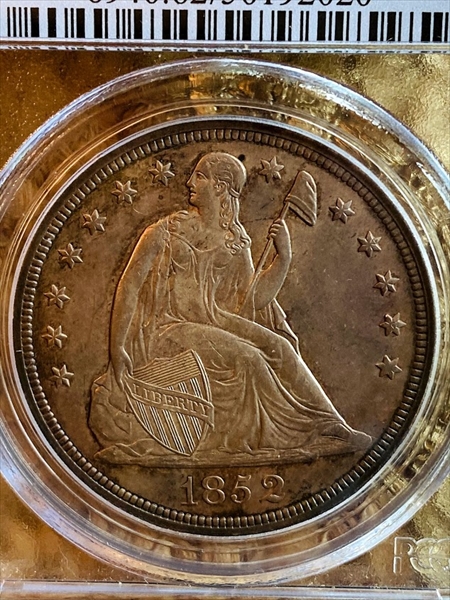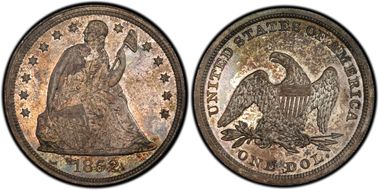1852 $1 MS62 认证号50192020, PCGS号6940
专家评论
Q. David Bowers
The following narrative, with minor editing, is from my "Silver Dollars & Trade Dollars of the United States: A Complete Encyclopedia" (Wolfeboro, NH: Bowers and Merena Galleries, Inc., 1993).Coinage Context
Low mintage: The price of silver continued to be high in 1852. The Mint struck a very limited quantity of silver dollars for this reason and also because for dollar coinage the Treasury much preferred the gold dollar. Most domestic transactions requiring this value were taken care of by gold dollars, which had been minted since 1849 and which were becoming popular in circulation. In the year 1852 the production of gold dollars at the Philadelphia Mint alone amounted to 2,045,351 coins. It is not known if the 1852 silver dollars were coined for depositors or for the account of the government. (R.W.Julian, letter to the author, March 10, 1992.)
Numismatic Information
Circulated grades: As is the case with circulated 1851 dollars, specimens of the 1852 were taken from circulation in the nineteenth century, when the date was already recognized as being scarce and valuable in any grade.
Today, the 1852 is a classic rarity. When specimens in such grades as VF and EF come on the market they furnish an opportunity for numismatists to acquire an example without having to pay the going rate for a higher level coin such as a Mint State or Proof example.
Mint State grades: Mint State coins seen by me have satiny, lustrous surfaces with minute die striations. Perhaps the Mint saved a few of these for trading purposes at the time of issue. In high grades the 1852 seems to be slightly rarer than the 1851, but the population is so small that no unequivocal conclusions can be drawn. I graded the Norweb Collection coin (Lot 3799) as MS-65, prooflike.
Estimates of the rarity of certain die combinations of originals versus restrikes is guesswork at this point. With the exception of Walter H. Breen's studies, virtually no one has examined the situation in detail; auction and sale catalogues are not useful as a source for information, etc. More than for any other date in the Liberty Seated series dated in the 1850s, research remains to be done on the 1852.
Unlike restrikes of the 1851 Proof dollar, which are usually referred to as restrikes in catalogues, restrikes of the 1852 dollar have not been studied as closely, are from the same obverse die as originals, and are usually catalogued simply as 1852 Proofs, without mention of original or restrike status.
Restrike impressions were made in silver (usually seen) and copper (exceedingly rare).
Several reverse varieties of restrikes are known, including the reverse of 1840-1850 with two minute points on the right slanting edge of the final A. Another reverse is that used on 1858-1859 Proofs and is seen on silver strikes as well as the rare copper restrikes. This may indicate restriking on multiple occasions. See description of varieties below.
Varieties
Circulation strikes:
1. Normal Date: Breen-5447. One obverse and three reverse dies were made. Circulation strikes, most often seen in grades of EF to AU, are from only one reverse die. Walter H. Breen describes it: "Earlier impressions show many nearly horizontal and fewer slanting die file marks within the reverse white stripes of shield; later strikings (after die repolish?) show none of these, only one minute spur from right edge of rightmost (sixth) pale gules or 'red' stripe." The typical original shows numerous vertical shield stripe elements extending above and into the horizontal stripes, and below and through the outside of the shield border; this is very distinctive.
Description of the Floyd T. Starr Collection:595 (Stack's, October 1992): Obverse: Die striae on obverse oriented in a direction parallel to the top of Miss Liberty's left leg. "Beard" on Liberty's chin. "Raindrop" circular ring dot on Miss Liberty's left forearm. Reverse: Shield lines as described above; first five vertical white spaces have considerable prooflike area, sixth has some prooflike area, seventh has none. Diagonal die striae extending at about a 45° angle from upper left to lower right.
Dies prepared: Obverse: 1; Reverse: Several (under study).
Circulation strike mintage: 1,100; Delivery figures by month: August: 1,100.
Estimated quantity melted: Unknown
Characteristics of striking: Usually sharp except for weakness at several stars to the right, especially 9 through 13.
Known hoards of Mint State coins: None
Commentary
This is the second rarest Philadelphia silver dollar and follows closely on the heels of the rare 1851.
Additional Information
A View of the 1852 Dollar
The Coin and Stamp Journal, April 1876, printed the following price history as part of an article titled "Rare American Coins":
"DOLLAR OF 1852. Number of pieces coined: 1,100. "The first we find catalogued, sold in the [Mortimer Livingston] MacKensie sale, June 23, 1869 [conducted by Edward Cogan], for $40. Described: '1852; brilliant Proof dollar; scarce and very desirable for a cabinet.'
"Another at the [William A.] Fewsmith sale [conducted by Ebenezer Locke Mason, October 1870] brought $25.
"At [Emil] Cauffman's sale, May, 1871 [conducted by Edward Cogan], the price obtained was $22. Described: 'Beautiful Proof; very desirable.'
'Jewett sale, Jan., 1874 [conducted by Edward Cogan]; price received, $41. Described: 'Beautiful Proof; very desirable.'"
PCGS #
6940
设计师
Christian Gobrecht
边缘
Reeded
直径
38.10 毫米
重量
26.73 克
铸币数量
1100
金属成分
90% Silver, 10% Copper
更高评级数量
5
评级较低的钱币数量
25
地区
The United States of America
价格指南
PCGS 数量报告
拍卖 - PCGS 评级的
拍卖 - NGC 评级的
稀有性和存量估计 了解更多
| 所有评级 | 325 |
| 60或以上 | 24 |
| 65或以上 | 1 |
| 所有评级 | R-6.3 |
| 60或以上 | R-9.0 |
| 65或以上 | R-10.0 |
| 所有评级 | 2 / 30 |
| 60或以上 | 2 / 30 TIE |
| 65或以上 | 1 / 30 TIE |
| 所有评级 | 5 / 45 |
| 60或以上 | 7 / 45 TIE |
| 65或以上 | 1 / 45 TIE |






















